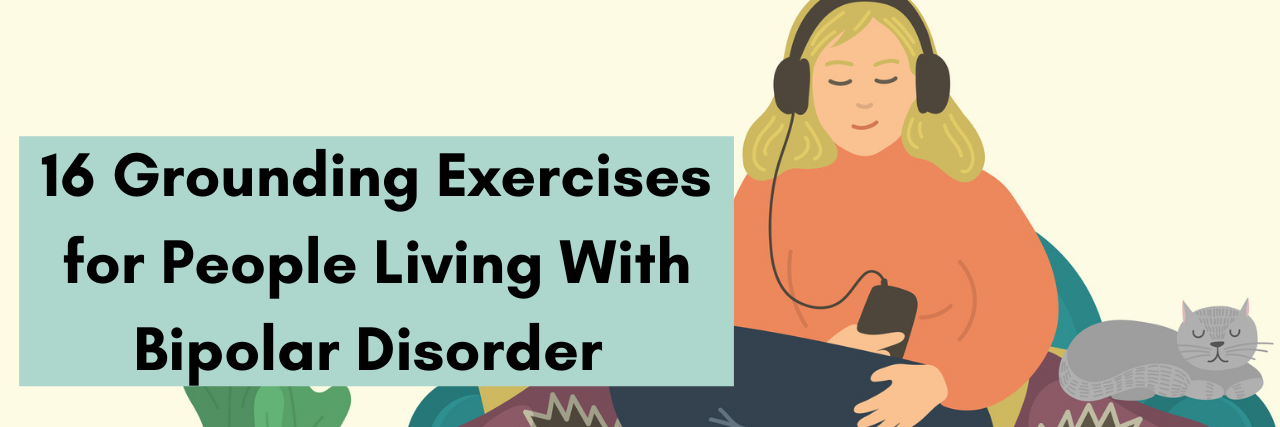16 Grounding Exercises for People Living With Bipolar Disorder
Grounding exercises are important for people living with mental illness, such as bipolar disorder, during something like a global pandemic. According to the Depression and Bipolar Support Alliance, bipolar disorder affects approximately 5.7 million adult Americans, or about 2.6% of the U.S. population age 18 and older, every year. And with the fluctuating state of this country and the world, depression and manic feelings can ebb and flow with the times as much as the symptoms of any other mental health condition.
This is why grounding exercises can help the entire mental illness community stay in the present instead of future-tripping or focusing on the past. These techniques have been known to greatly support people living with things like anxiety and depression, two common symptoms of bipolar disorder. Specifically for bipolar, some people shared that grounding themselves during a manic episode helps them expend their endless energy. Of course, everyone is different, so different exercises work better for different people.
We talked to our own bipolar community and asked them what helps them stay grounded during this difficult time. Here is what they had to say:
- “Simply having someone listen to me, try to understand me and validate my experience has facilitated a healing process that has far outlived the manic episodes themselves.”
- “When I’m manic, some things I find helpful are just talking to someone and letting all that energy out, or writing out all my energy into my novels. It usually happens at night, so by the time I’m done with one of those things, I’m tired.”
- “Painting and making pom-poms out of balls of wool helps when I’m manic.”
- “My mind is typically going a mile a minute with every idea. I usually grab a pen and piece of paper and just see what happens. Sometimes I create things, sometimes I write a list of my ideas over and over, sometimes I just sit there with a super rapid mind, unable to do anything. But it works to keep me safe and out of trouble.”
- “Walking my dog with music in my headphones.”
- “When I’m depressed, farm simulation or sand games help. I don’t have to worry about enemies, and there’s no time limit or major quests to finish. I can just plant potatoes in peace.”
- “I feel a very strong need to communicate with others when manic. Instead of texting/calling friends/family or telling my life story to a checkout clerk, I do in-depth reviews of products I have purchased on Amazon. In fact, I did so many that Amazon asked me to join their vine program, where I get free items to review. So now I can also ‘shop’ for a limited amount of free items when manic.”
- “Puzzles keep my hands busy and audiobooks keep my mind busy. This is the best way to help my mind process everything slowly, rather than be bombarded by all the thoughts and feelings at once.”
- “The 5,4,3,2,1 method can help in a manic state…at times. But grounding has never exactly been a helpful tool for me. Nothing can really seem to stop me in those moments, honestly.”
- “I often take warm showers and slowly adjust the temperature to the coldest I can manage. This may seem harmful, but it helps me feel ‘awakened’ when I can’t stay grounded. Any sudden ‘shock’ to my body seems to bring me back to reality if I’m feeling faded.”
- “Truthfully the best thing to do is remove all sources that help you disassociate (social media, TV and computers) and place yourself somewhere you can stay grounded easier.”
- “My husband talks to me about anything, just to refocus. It helps most of the time.”
- “Before my mom passed, she had bought me a weighted blanket for Christmas. She thought it would help me when I had episodes. It’s amazing.”
- “I write in a journal to get out feelings. Then I take my creativity to my Google docs and work on my novel or short stories.”
- “I’ll watch stand-up comedy.”
- “I listen to loud, angry music.”
Editor’s note: Some responses have been shortened and edited for clarity.
If you’d like to learn more about bipolar disorder and find resources, visit the International Bipolar Foundation.

